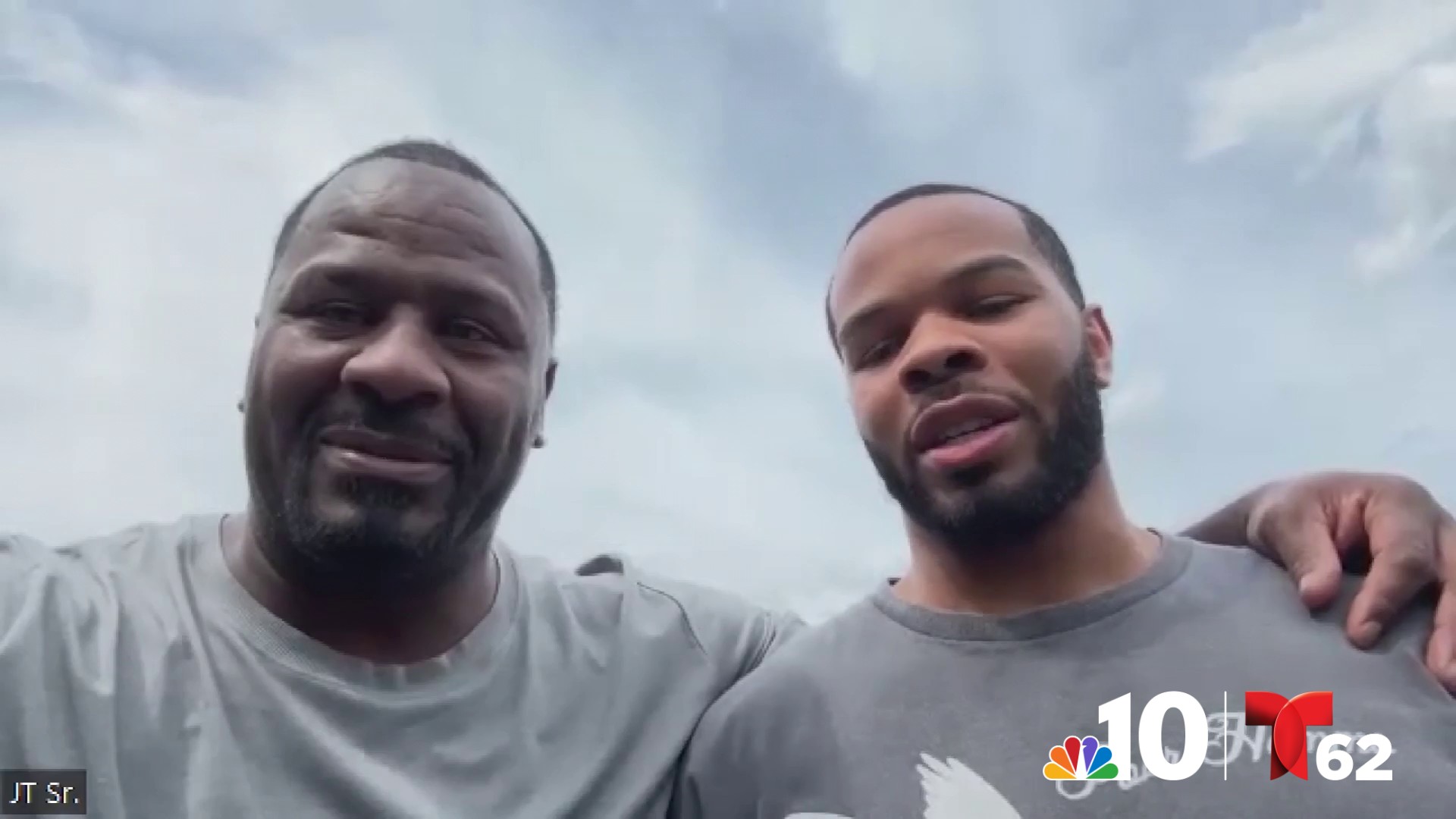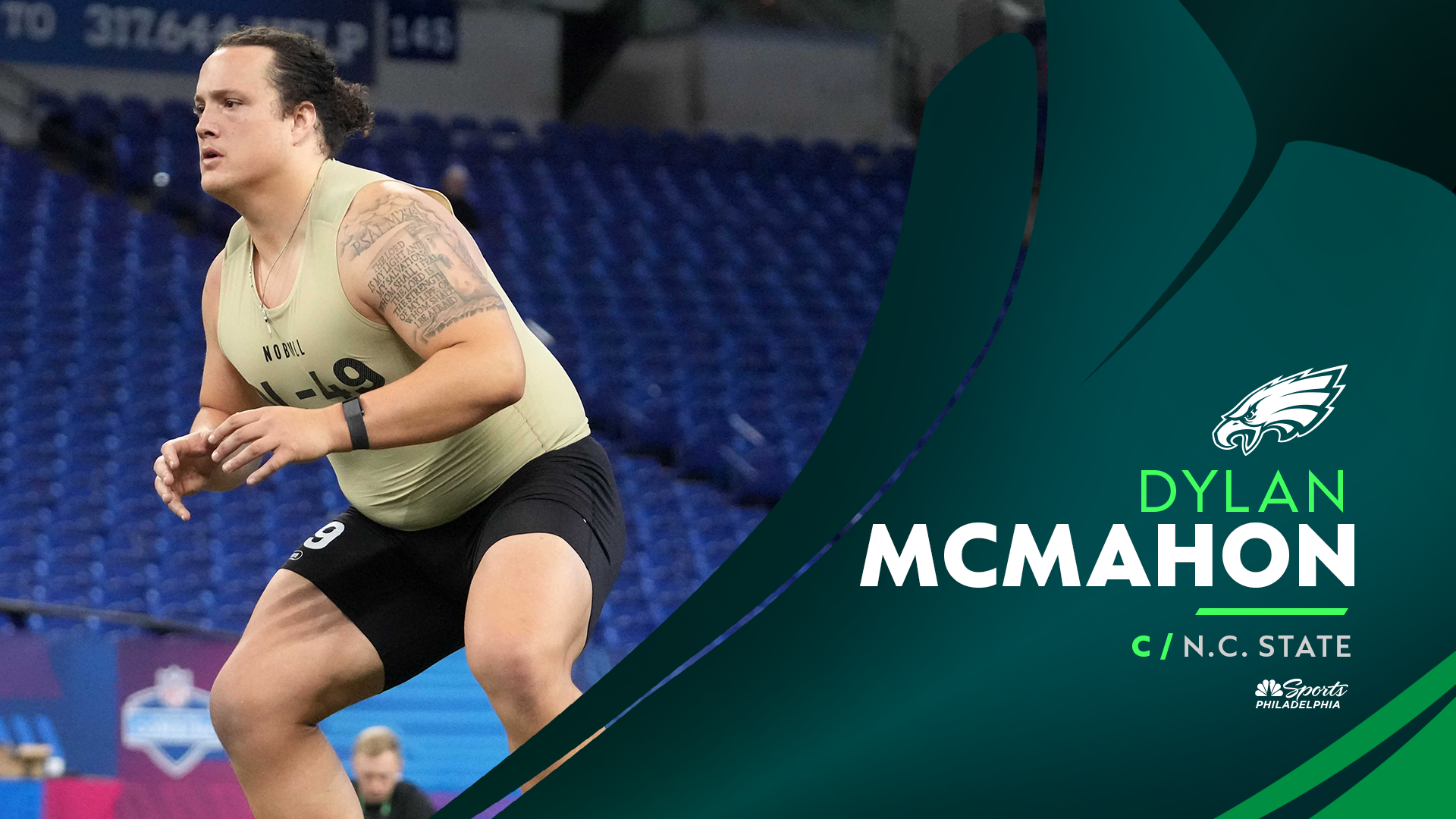There are a lot of people watching Malcolm Jenkins. There are a lot of people counting on Malcolm Jenkins. There are a lot of people inspired by Malcolm Jenkins.
There are a lot of people who hate Malcolm Jenkins.
Jenkins feels the hate; he knows it exists. He hears the naysayers. He hears the folks who call him unpatriotic or much, much worse. In 2018, in this internet age, it sort of comes with the territory. Anonymity only fuels the negativity he faces.
"Anything can be frustrating," Jenkins said to NBC Sports Philadelphia this week. "Therein lies the power of those who oppose you. If they can get under your skin, they win. So I never allow that to block my judgment or even come off in my interviews."
Jenkins is uncomfortable with being the face of a movement.
The Eagles' 30-year-old Pro Bowl safety admits as much, but he's not oblivious. He's uncomfortable with the idea because there are so many others committed to the fight - his fight - against racial injustice and police brutality in the United States. He names them - Colin Kaepernick, Eric Reid, Kenny Stills, Mike Thomas, Russell Okung, Anquan Boldin, Devin McCourty - before allowing that there are even more of whom he's probably unaware.
Philadelphia Eagles
Complete coverage of the Philadelphia Eagles and their NFL rivals from NBC Sports Philadelphia.
But still, here we are. Jenkins has just finished up a long session in the Eagles' indoor practice bubble, but during the few hours the team was inside, the sun began to peek out from behind the clouds and it's now shining. As Jenkins slides outside, stepping on to the asphalt parking lot with his cleats clacking, his manicured black beard dripping with sweat glistens in the sunlight.
He's stoic in his resolve.
Reluctant as he is to claim it, Jenkins knows he's a face of a movement. His face is second behind perhaps just Kaepernick's in notoriety throughout this fight over the last two years. As such, Jenkins always speaks comprehensively, deliberately.
Dealing with the hate
There are a few reasons Jenkins is able to deal with all that negativity. First, he thanks the folks around him who keep him motivated and focused on what's important. For Jenkins, that's affecting positive change in matters of racial injustice, police brutality and criminal justice reform.
His support system definitely helps.
"I think the other part is constantly having to remind myself about the why," Jenkins said. "Why we're doing this and also the results we're able to see. What we're trying to tackle is so large and has been here for so long, it can get frustrating with the pace of progress or the things that you read.
"We've actually accomplished a ton in two years. So I often have to remind myself about that and who's counting on not only me but us. And when I think about those things, it helps block out or ignore all that other stuff."
For how much negativity Jenkins receives, it's impressive he's been able to keep his composure. Teammate Chris Long, who has received some similar negativity for simply backing up Jenkins with his words and with a gesture - placing his arm around Jenkins while Jenkins raises his fist in demonstration during the national anthem - is impressed by Jenkins' maturity.
More than anything. Long is impressed by Jenkins' patience with people.
"He's gotten a lot of negativity, obviously, from people who disagree with him," Long said. "Even people that agree with Malc, sometimes want him to do things differently. Everybody has a better plan. Everybody has a better plan for how an influencer should go about their business, even if you agree. So he gets it from everywhere. I just think he's tremendously stoic about it and just sticks to the plan, sticks to the work he does off the field. He doesn't waver. And he doesn't lash out either. So he's better than me about that."
How it began
This fight really began for Jenkins just over two years ago. In July 2016, he and some teammates met with Philadelphia police commissioner Richard Ross, some police officers and some community leaders. It was a small meeting, a conversation really, between Jenkins, his teammates and the police force. The meeting was about the struggles between the black community and how it felt about police and what could be done to improve those relations. On the flip side, Jenkins said he wanted to hear law enforcement's side and learn how he could help. He's had many meetings with police and legislators since, but that was a beginning.
A few weeks later, Kaepernick kneeled during the national anthem - he sat for the previous week's game before compromising - and it became a national story. Kaepernick told NFL.com that he was not going to "show pride in a flag for a country that oppresses black people and people of color."
When Jenkins saw that form of protest, something clicked.
"I think for me, it showed that there are other guys out there who are feeling the same frustrations as me amongst my peers," Jenkins said. "And, two, what Colin taught all of us is how much social capital we have as athletes. We might not be the richest out there or the experts or the politicians. We have social capital and can literally change the dialogue in the conversation worldwide. At that moment, I thought if we can create these different moments in silos as individuals, how impactful could it be if we collectively did something? I think for me, that's when that vision was planted."
Why it continues
On Sept. 19, 2016, Jenkins began raising his fist during the national anthem, joining Kaepernick in demonstration. He did it every week until late last season when he felt encouraged by the NFL's commitment to the causes important to him and his fellow demonstrators. But after this offseason - the NFL created a national anthem policy, Cowboys owner Jerry Jones said publicly that his players would be required to stand for the anthem and the President remained outspoken on the topic - Jenkins raised his fist again in the Eagles' first preseason game. He was joined by young cornerback De'Vante Bausby. Long resumed placing his arm around Jenkins.
Many times over the last two years, the anthem demonstrations have seemingly overshadowed the reasons for the demonstrations. Last summer, Jenkins even pondered ending his demonstration for fear that the story would become more about him and less about the issues (see story). Ultimately, he decided - and said recently - that there's simply no better way to reach his audience than demonstrating during the anthem.
For Jenkins, though, the demonstration isn't hollow. He backs up his words with action. He has met with lawmakers. He has met with police. He has helped raise money and give back to communities and underprivileged youth through The Malcolm Jenkins Foundation.
Jenkins is proud of the progress, while still understanding there's a lot of work left to be done.
Those two things aren't mutually exclusive. I'm always proud of what we've been able to do. I'm proud of the guys who all contributed and I'm proud of Colin Kaepernick, who started this thing. I'm proud of everybody else who contributed. But I'm also driven by a constant reminder daily in my own walk in my black skin and just seeing what continues to come through in news clips of people being brutalized by police. Knowing that, every day, I get to live my life and go to practice and play this game, and recognizing that we have so many people who, for no reason at all, are sitting behind bars or being robbed of opportunities of education or being robbed of opportunities for advancement economically. That stuff being ever present is constantly motivating.
The issues are still the only driving force for Jenkins, so anytime the conversation begins to veer toward something else, he carefully directs it back. After the White House canceled the Eagles' invite earlier this offseason, instead of getting in a war of words with the leader of the free world, Jenkins resorted to using giant flash cards, the first of which said, "YOU AREN'T LISTENING."
Long praised Jenkins for that move, calling it "brilliant."
"He's very good at moving the needle and getting things done and articulating the points he wants to talk about in really clever ways, in a sound byte news culture," Long said. "Everything he does is calculated in a really good way and he's just authentic."
Reluctant as he may be, Jenkins is the stoic face of this movement. And the movement is better for it.



